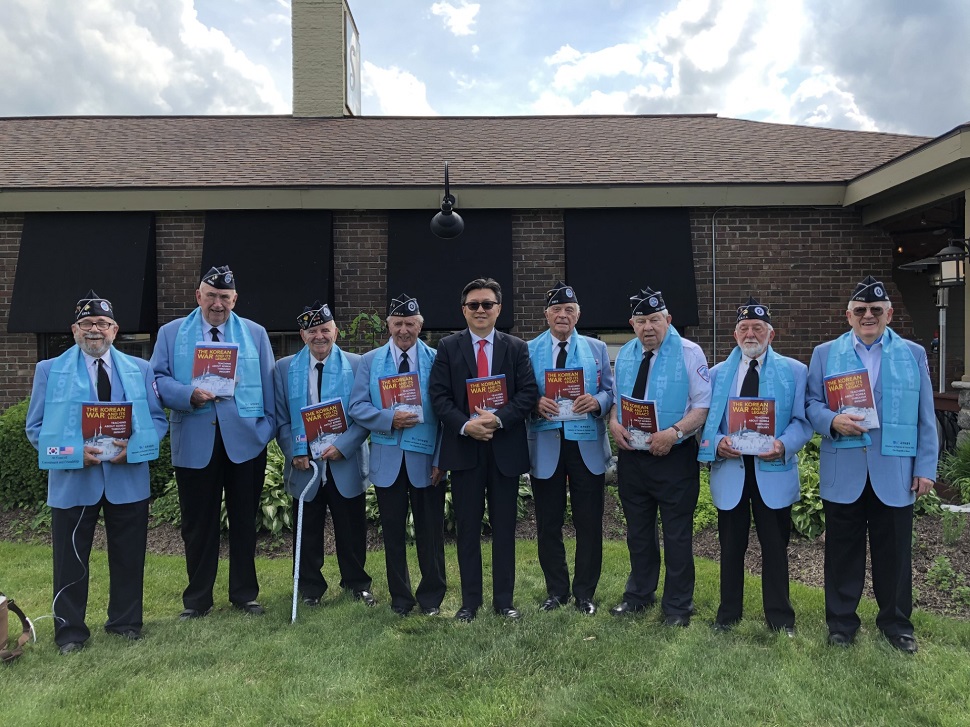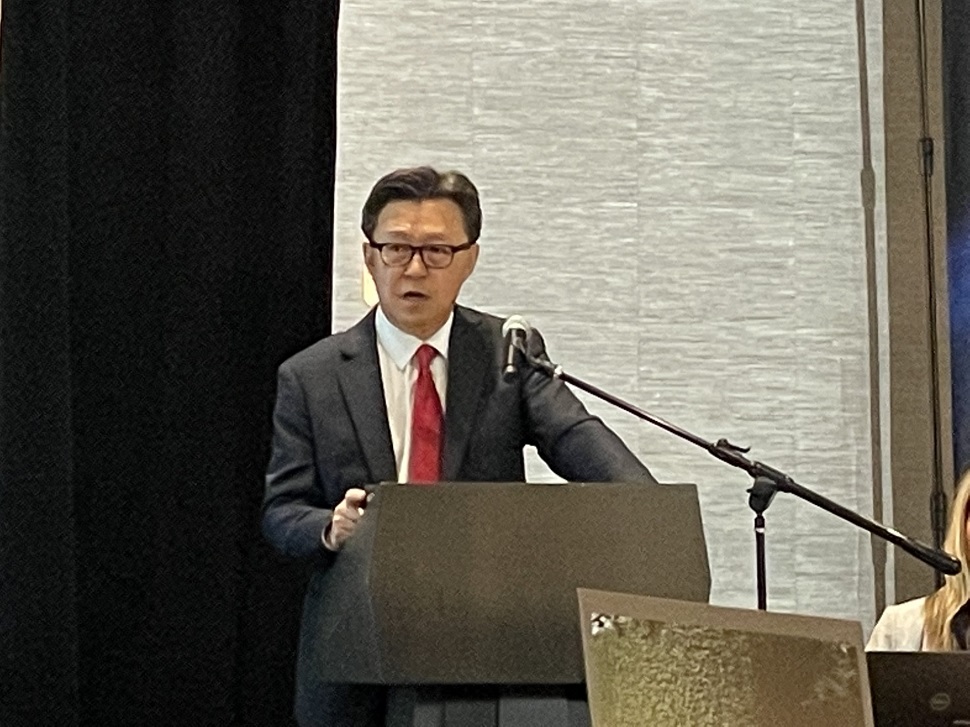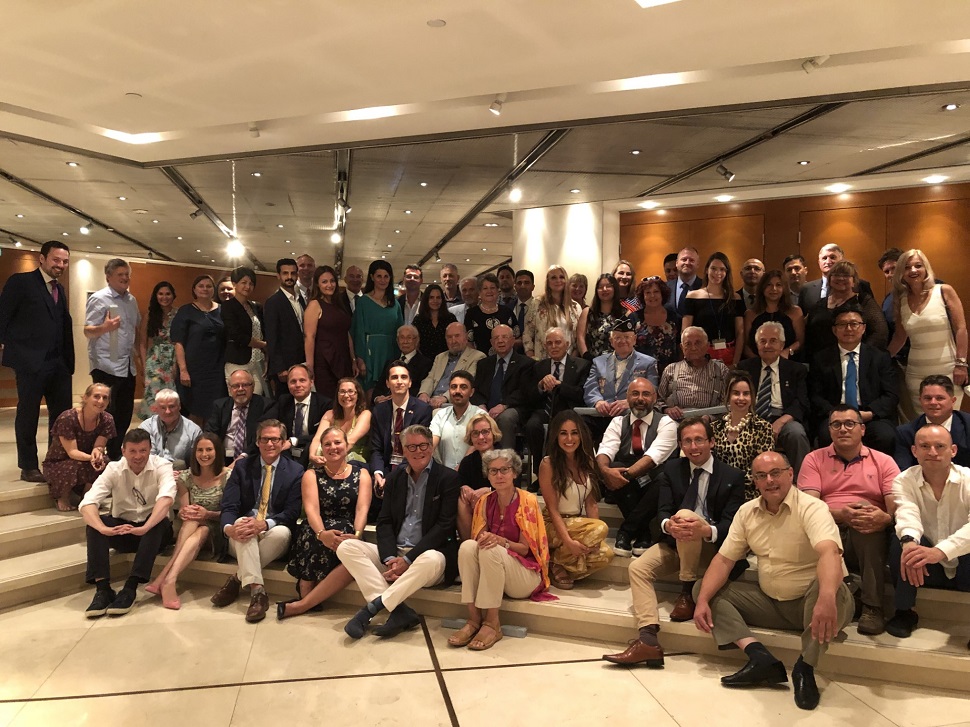[Jun] Teaching posterity will ensure sustainability of Korean War legacy
Date Jun 26, 2023
 Outside a Syracuse, New York, restaurant in June 2019, local Korean War veterans hold up “The Korean War and its Legacy,” a history book for elementary, middle and high school students published by the Korean War Legacy Foundation that year. (Photo by the Korean War Legacy Foundation)
Outside a Syracuse, New York, restaurant in June 2019, local Korean War veterans hold up “The Korean War and its Legacy,” a history book for elementary, middle and high school students published by the Korean War Legacy Foundation that year. (Photo by the Korean War Legacy Foundation)
As the Korean War began on June 25, 1950, the month of June in South Korea has been about remembering the soldiers and patriots who died protecting their homeland. Along with efforts in Korea, devotees abroad such as Han Jong-woo, President of the Korean War Legacy Foundation, work to remember the foreign soldiers who sacrificed their lives fighting in the 1950-53 Korean War.
Han, who lives in the United States, sees the 70th anniversary of the alliance between South Korea and the United States as a critical milestone to truly honor once again the Korean War veterans from the 22 participating U.N. member nations.
“The growing conflict between the United States and China in the South China Sea over Taiwan in particular as well as hegemony over global supply chains makes Washington’s alliance with Seoul all the more important this year as the alliance and the Korean War ceasefire mark seven decades,” Han said in an email interview.
But with the average age of war veterans standing at 92, South Korea needs a “Copernicus-like shift” in thinking in remembering these fallen soldiers by aggressively expanding efforts to document their stories. Such documentation included interviews with veterans that were later compiled into educational material taught at elementary, middle and high schools. Their stories have also contributed to the digital archive of nations that fought in the Korean War and made it possible to train and aid history teachers in each of the 22 U.N. countries by supplementing curriculum resources related to the War.
“To date, South Korea’s program of inviting the veterans to the country that they had fought for to let them see its recovery and rise to the world’s 10th largest economy has been successful. It has been to show our gratitude, but it’s also a way for us Koreans to take pride in what we have achieved.”
“It is a bit ironic, but through this documentation and education, Korea can also adopt a new policy paradigm of ‘education through public diplomacy for veterans,’” Han said. It will enable the sustainability of the hitherto successful “revisit Korea” programs for veterans by adding materials that teach students about the contributions of the 22 U.N. member nations that supported the South.
 Han Jong-woo, Korean War Legacy Foundation President, speaks at the 3rd World Congress held in Washington, D.C., a gathering of history teachers from elementary, middle and high schools to discuss how to teach the legacy of the Korean War through the stories of veterans. (Photo by the Korean War Legacy Foundation)
Han Jong-woo, Korean War Legacy Foundation President, speaks at the 3rd World Congress held in Washington, D.C., a gathering of history teachers from elementary, middle and high schools to discuss how to teach the legacy of the Korean War through the stories of veterans. (Photo by the Korean War Legacy Foundation)
The Korean War Legacy Foundation is a non-profit organization based in the state of New York that is staffed by U.S. full-time social studies teachers who work for the foundation part-time. The Korean Ministry of Patriots and Veterans Affairs (MPVA) assists the foundation.
Since 2012, his foundation has been digitizing interviews and stories mainly with American veterans of the Korean War with the assistance of the Ministry of Patriots and Veterans Affairs. These testimonies have already been compiled into books that have supplemented curriculum in two of the nations that fought alongside Korea – “The Korean War and Its Legacy” (2019, U.S.) and “Exploring and Teaching the Korean War” (2021, U.K.). The foundation will also host the Fourth World Congress in Vancouver, British Columbia, during August 1-4 where a new reference book for Korean War-related curriculum in Canada will be released. This year, the foundation will start working on source material for teachers in New Zealand and Turkey. The Congress brings together history teachers – the deliverers of the documented material to posterity – from the 22 nations that participated in the Korean War through the U.N.
 The World Congress held in Athens, Greece, with teachers from 16 nations that fought in the 1950-53 Korean War. (Photo by the Korean War Legacy Foundation)
The World Congress held in Athens, Greece, with teachers from 16 nations that fought in the 1950-53 Korean War. (Photo by the Korean War Legacy Foundation)
Han called the recent upgrade of the Ministry of Patriots and Veterans Affairs much belated and needed.
“Up until now, no MPVA official in the Korean Embassy in Washington, D.C., was solely responsible for the Korean War or ceasefire anniversaries,” Han said. “With the upgrade, the ministry can now dispatch officials to Korean embassies who are tasked with carrying out public diplomacy on veterans affairs,” he said.
The belated burial of the ashes of PFC Kim Bong-hak in the grave of his brother Kim Seong-hak at Seoul National Cemetery on June 6, Korea’s Memorial Day, demonstrates the need to document the works of the Defense POW/MIA Accounting Agency (DPAA), Han said. PFC Kim’s remains were discovered in 2011 and identified in February 2023. The body of his brother had been identified during the fighting in December 1950. The DPAA shared data with Han’s foundation when they published “Honoring Sacrifice” in tandem with the Wall of Remembrance unveiling in Arlington in Washington, D.C., in 2022.
Decades have passed since the Korean War, but the world should not forget its significance.
“The Korean War announced the start of the Cold War era, and the Acheson Line drawn back then continues to drive the increasing U.S.-China rivalry, which compels South Korea to strike a balance when seeking to maintain access to the Chinese market and uphold the alliance with the United States. The Korean War also still impacts current affairs connected to China, Taiwan, the ROK-U.S. alliance and South Korea’s relationship with Japan. We have to educate future generations about this importance,” said Han. In April 2022, Han’s book “The Metamorphosis of U.S.-Korea Relations: The Korean Question Revisited” was published by Lexington Books.

The Ministry of Culture, Sports and Tourism's "Korea Here & Now" work can be used under the condition of "Public Nuri Type 1 (Source Indication)."




